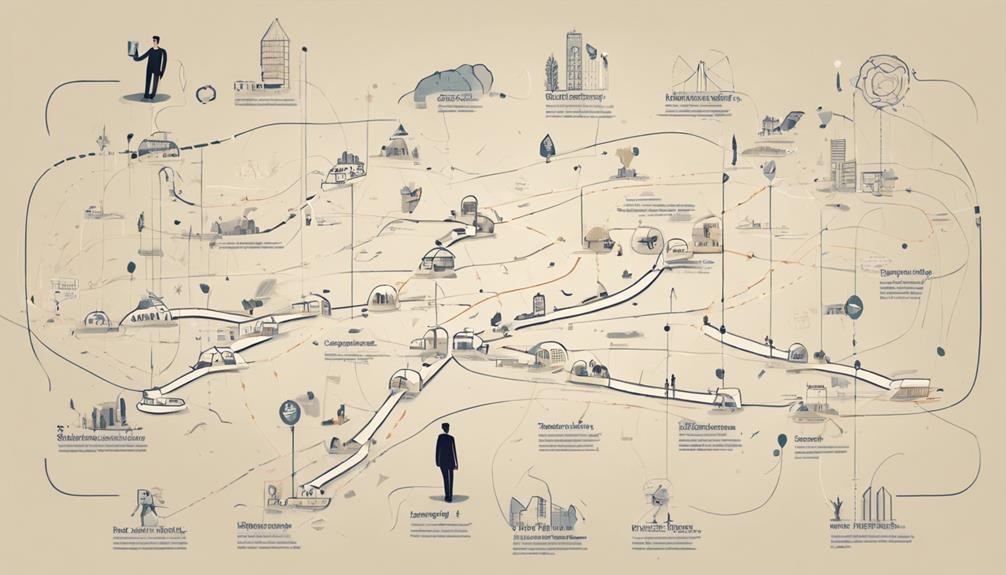
To catapult your career to the next level, start by identifying your strengths and core values to inform your career goals. Develop a robust professional network through attending industry events and engaging with colleagues and thought leaders on LinkedIn. Craft a strategic career development plan, complete with SMART goals and a SWOT analysis, and continuously refine your transferable skills, including technical expertise and emotional intelligence. Mastering these fundamental steps sets you up for navigating workplace challenges and achieving professional success, and the path to reaching your goals starts by tackling these crucial development milestones head-on – now what's the next step in your journey?
Key Takeaways
- Conduct a personal inventory to identify skills, abilities, and accomplishments that align with career goals.
- Build a professional network by attending industry events, joining organizations, and leveraging social media platforms.
- Create a career development plan with SMART goals, SWOT analysis, and strategies to address skill gaps.
- Develop transferable skills such as effective communication, emotional intelligence, and teamwork to adapt to changing job requirements.
Identifying Your Career Strengths

To identify your career strengths, start by taking a personal inventory of your skills, abilities, and accomplishments that have contributed to your past successes. This self-reflection is crucial in developing self-awareness, which is essential for career growth.
Ask yourself: What're my core values, and how do they align with my career goals? What're my greatest strengths, and how have I utilized them in previous roles?
Cultivating emotional intelligence is also vital in identifying your career strengths. Recognize how your emotions impact your decision-making and relationships with colleagues. Consider seeking feedback from trusted friends, family, or mentors to gain a more objective perspective on your strengths.
Reflect on your past experiences, and identify patterns of success. What skills did you use to achieve those successes? How can you leverage those skills in your current or future roles?
Building a Professional Network
Having identified your career strengths, you're now ready to amplify your professional presence by building a network that can help you leverage those strengths and achieve your career goals.
Building a professional network is about creating a web of relationships that can provide support, guidance, and opportunities for growth. To start, focus on expanding your community connections by attending industry events, joining professional organizations, and volunteering for causes you're passionate about. This will help you meet like-minded individuals who share your interests and values.
In addition to in-person connections, leveraging social media can also be a powerful way to build your network. Utilize platforms like LinkedIn to connect with colleagues, peers, and industry leaders. Engage with their content, share your own insights, and participate in online discussions to establish yourself as a thought leader in your field.
Creating a Career Development Plan

As you move forward with your career development, it's essential that you create a plan that outlines your objectives and the steps you'll take to achieve them.
You'll need to set clear career goals that are specific, measurable, and aligned with your values and aspirations.
To create an effective plan, you'll also need to identify any skill gaps that may be holding you back, and develop a strategy for addressing them.
Setting Career Goals
Creating a career development plan starts with setting three to five specific, measurable, achievable, relevant, and time-bound (SMART) career goals that align with your values, skills, and interests. This is where you define what success means to you and create a roadmap to achieve it. To set realistic milestones, start by conducting self-assessments to identify your strengths, weaknesses, opportunities, and threats (SWOT analysis).
| Goal | Description | Target Date |
|---|---|---|
| Short-term goal 1 | Take on additional responsibilities at work | 3 months |
| Short-term goal 2 | Attend a professional conference | 6 months |
| Mid-term goal | Pursue a certification or training | 1 year |
| Mid-term goal | Take on a leadership role | 18 months |
| Long-term goal | Transition to a new industry or role | 3-5 years |
When setting your goals, make sure they are aligned with your values and priorities. Break down larger goals into smaller, manageable tasks to maintain momentum and motivation. Regularly review and adjust your goals to ensure you're on track to achieving your vision. By setting SMART goals and conducting self-assessments, you'll be well on your way to creating a comprehensive career development plan that drives your professional success.
Identifying Skill Gaps
You've identified your career goals, but do you have the necessary skills to achieve them – it's time to conduct a skill gap analysis to determine what skills you need to acquire or develop.
This crucial step in creating a career development plan will help you bridge the gap between where you're and where you want to be. Conducting skills assessments will allow you to take an honest look at your strengths and weaknesses, improving self-awareness and helping you make informed decisions about your career path.
When conducting a skill gap analysis, start by making a list of the skills required for your desired role. Then, assess your current skills and experience, identifying areas where you excel and areas where you need improvement.
Be honest with yourself – it's okay to acknowledge gaps in your skills. By recognizing these gaps, you can create a plan to acquire the necessary skills through training, mentorship, or experience. By doing so, you'll be one step closer to achieving your career goals and taking your professional success to the next level.
Developing Transferable Skills
To develop transferable skills that can boost your career prospects, you'll want to focus on building a strong foundation of core competencies, such as problem-solving and leadership.
Enhancing your soft skills, like communication and teamwork, will also help you stand out in a competitive job market.
Building Core Competencies
Developing a strong set of core competencies is crucial for men who want to advance in their careers, as it enables them to adapt to changing job requirements and industries.
By building core competencies, you'll become a more versatile and valuable employee, capable of taking on new challenges and responsibilities.
To start, focus on expanding your technical knowledge in areas relevant to your industry. Stay up-to-date with the latest trends, tools, and methodologies by attending conferences, workshops, and online courses. This will help you stay ahead of the curve and make informed decisions in your role.
Another key aspect of building core competencies is optimizing work processes. Analyze your current workflow and identify areas where you can streamline tasks, eliminate inefficiencies, and improve productivity. By doing so, you'll not only save time but also enhance the quality of your work.
As you continue to develop your core competencies, you'll become a more confident and capable professional, poised for success in your career. By focusing on these key areas, you'll be well on your way to building a strong foundation for long-term career growth and advancement.
Enhancing Soft Skills
Effective career advancement relies heavily on a well-rounded set of soft skills that can be transferred across different roles, industries, and contexts. As you navigate your professional journey, it's essential to focus on developing these skills to stay competitive and adaptable.
One of the most critical soft skills is effective communication. You need to be able to articulate your ideas, listen actively, and respond thoughtfully to build strong relationships with colleagues, clients, and managers.
Emotional intelligence is another vital soft skill that enables you to understand and manage your emotions, as well as empathize with others. By developing emotional intelligence, you'll become a more effective team player, leader, and problem-solver.
To enhance your soft skills, start by seeking feedback from trusted mentors, colleagues, or managers. Identify areas for improvement and create a plan to address them.
Practice active listening, ask open-ended questions, and clarify expectations to improve your communication skills. Additionally, engage in self-reflection, recognize your emotional triggers, and develop strategies to manage stress and conflict.
Mastering Technical Abilities
Mastering technical abilities is crucial for career advancement, as it enables you to stay adaptable in a rapidly changing job market and expand your professional opportunities. By advancing your technical prowess, you'll become a more valuable asset to your organization and increase your chances of career progression.
To achieve this, focus on mastering specialized tools and software relevant to your industry. Stay up-to-date with the latest technologies and trends by attending workshops, webinars, and conferences.
Developing transferable skills, such as data analysis, digital marketing, or coding, will also enhance your technical abilities. These skills are highly sought after by employers and can be applied to various roles and industries.
Navigating Workplace Challenges

As you navigate the complexities of your workplace, you'll inevitably encounter challenges that test your skills, patience, and resolve. One of the most significant hurdles you may face is overcoming bias. Whether it's conscious or unconscious, bias can impact your career advancement and overall job satisfaction. To overcome bias, it's essential to develop a growth mindset, focus on your strengths, and build a support network of colleagues and mentors who can provide guidance and encouragement.
Managing office politics is another crucial aspect of navigating workplace challenges. This involves being aware of the power dynamics at play, building relationships with key stakeholders, and communicating effectively to achieve your goals.
Here are some strategies to help you navigate workplace challenges:
| Challenge | Strategy | Outcome |
|---|---|---|
| Overcoming bias | Develop a growth mindset, focus on strengths, build a support network | Increased confidence and career advancement |
| Managing office politics | Build relationships with key stakeholders, communicate effectively | Improved collaboration and goal achievement |
| Dealing with conflict | Stay calm, listen actively, seek common ground | Resolved conflicts and improved working relationships |
Advancing in Your Career
You're now poised to take your career to the next level, and advancing in your career requires a strategic approach that aligns your skills, experience, and goals with the needs of your organization. To achieve this, it's essential to identify areas where you can add value and take on new challenges.
Consider leveraging mentorships with experienced professionals who can provide guidance and support. They can help you navigate the organization, identify opportunities, and develop the skills you need to succeed.
As you advance in your career, you may also want to explore entrepreneurship opportunities within your organization. This could involve leading a new project, developing a new product or service, or taking on a leadership role. By exploring entrepreneurship, you can demonstrate your ability to innovate and drive growth, which can be a key factor in advancing your career.
Achieving Work-Life Balance

Achieving a balance between your work and personal life is crucial for maintaining your overall well-being and job satisfaction, and it requires intentional effort and boundary-setting to separate your professional and personal responsibilities effectively.
By setting clear boundaries and prioritizing your time, you can avoid burnout and create a healthier work-life balance. Managing family commitments, maintaining physical health, and making time for self-care are essential to achieving this balance.
To prioritize your work-life balance, consider the following:
- Establish a routine: Create a schedule that balances your work, family, and personal time.
- Communicate with your employer and loved ones: Be open and transparent about your needs and boundaries to avoid conflicts and overcommitting.
- Take care of your physical and mental health: Engage in activities that nourish your body and mind, such as exercise, meditation, and hobbies.
Conclusion
As you chart your course to professional success, remember that career development is a continuous journey, not a destination.
It's like rowing a boat across a vast lake – you must adapt to changing currents, stay focused on your horizon, and make deliberate strokes to reach your goals.
With a solid roadmap, self-awareness, and persistence, you'll navigate challenges and arrive at new shores, transformed and triumphant, with a career that fulfills and propels you forward.
